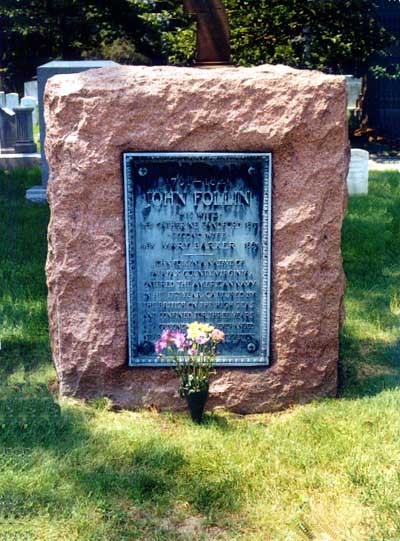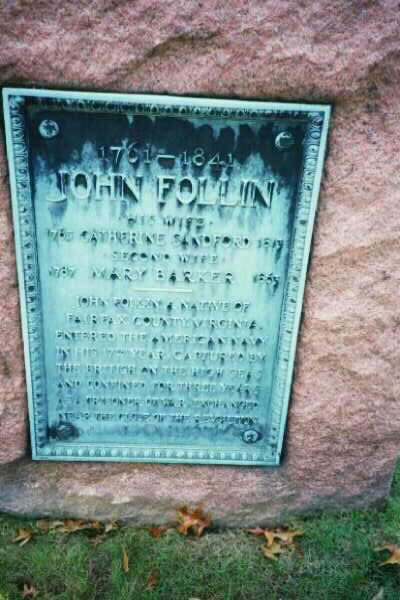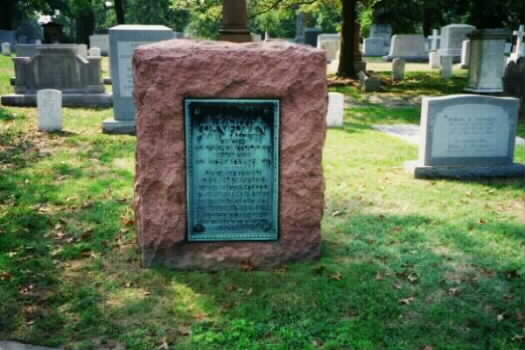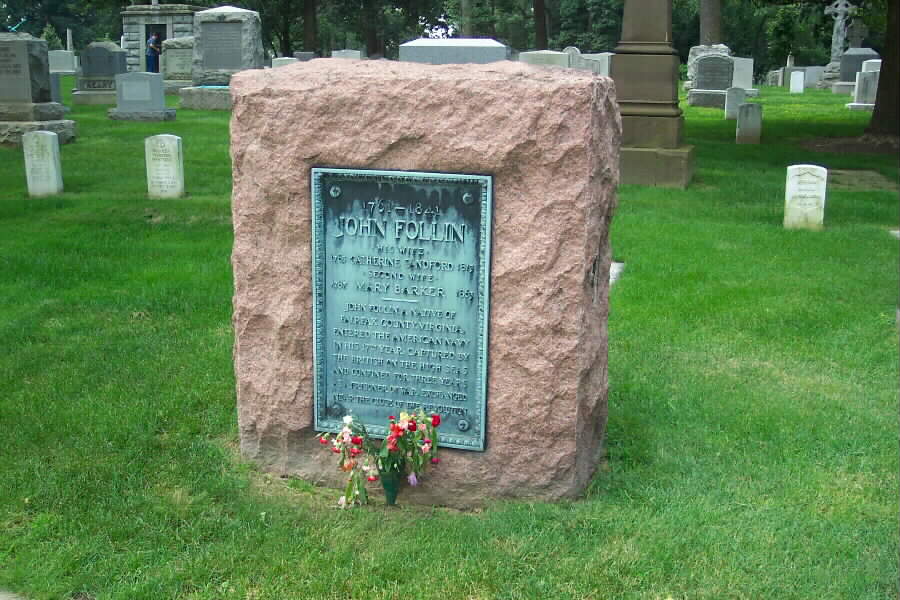A veteran of the Revolutionary War, he was a prisoner-of-war for three years, being released at the end of the war. He was born in 1761 and died in 1841.
He was originally buried elsewhere (research continues) and was reinterred in Section 1 of Arlington National Cemetery.
His first wife, Catherine Sanford Follin (1765-1817) and his second wife, Mary Baker Follin (1787-1863) are buried with him.
A realtive, Gabriel Edmonston, fought for the Confederacy in the Civil War and is also buried in Arlington National Cemetery.
Cancer motivated woman to research family heritage
Courtesy of the Palm Beach Post
After her battle with ovarian cancer, Brenda Pike wanted to learn about her family’s heritage so she could pass it on to her children.
“I wanted to make sure that … if something happened to me, that there was a legacy — that (my children) knew where they came from,” said Pike, a Wellington resident.
Pike, who was diagnosed with cancer in 1998, began researching her family’s heritage in 2002 and attending meetings of Daughters of the American Revolution, a national organization of women who are related to a patriot from the American Revolution.
In 2003, she uncovered the ancestor who qualified her for membership.
“I kept going up and down different family tree lines and the last one I decided to investigate was the one where I found my connection,” she said. “John Follin was a sailor held prisoner of war aboard a British man-of-war for three years during the Revolution.”
Follin is one of ten Revolutionary War veterans interred at Arlington National Cemetery. His son, Edward, was a soldier in the War of 1812. Pike discovered his grave in a cemetery in Missouri. She’ll attend and speak at a ceremony to mark his grave this summer.
Though she’s been cancer-free for seven years, Pike, 46, still enjoys learning about her ancestors and passing the lessons of history on to her children, Keilly, 12, and Zachary, 9, who are members of the local chapter of Children of the American Revolution.
Her daughter seems to enjoy learning from the past. Pike said Keilly plans to attend the CAR state convention and run for one of the group’s state offices. Zachary is too young to understand it all, but Pike said said his involvement in CAR is important for establishing patriotic values.
“You can’t teach patriotism just by saying you’ve got to stand up for the flag,” she said. “You’ve got to teach it by teaching them how to serve the people who served our country.”
As the historian of DAR’s Wellington chapter, Pike is responsible for keeping a scrapbook of the group’s events, collecting news clippings and organizing the group’s yearly essay contests and Outstanding American History Teacher nomination. She’s about to end two years as a senior leader for CAR.
Local DAR chapters visit veterans’ hospitals and make donations, support soldiers serving overseas and participate in other community service projects.
This year, the Wellington chapter supported the Forgotten Soldier Program, which sends donations to soldiers in Iraq; delivered magazines, books and quilts to patients at the VA Hospital in Riviera Beach; and sent money to two schools supported by DAR.
One of the schools is exclusively for American Indians. “We donated, like, $300 towards winter coats [for the students],” Pike said.
The women take collections at the meetings and sell raffle tickets and memorabilia to raise money for DAR projects. Each year, the chapter also nominates a local teacher as its Outstanding Teacher of American History.
Pike said uncovering her family’s history has reaffirmed her desire to instill positive values in her kids. “You learn from history,” she said. “I came from an extremely patriotic, God-fearing family. It is a generational thing. I can see, going back generation to generation, the parents taught the children what was right, what was wrong and how to be a person that counts.
“It doesn’t mean they have their name in the history book or anything, but they were part of the social fabric.”
From a letter from Thos. Stork on the death of John Follin
“Freeland, Fairfax County, Virginia
“June 21st, 1841
“My Dear Henrietta. I’ve just returned from attending the funeral of our departed Friend, Mr. Follin senr who died on the 19th ult. As regards the Exit of this estimable Man it may in truth be said that a Pillar of strength “in Israel” has fallen. The incidents of his eventful Life, afford matter for the Historic pen, as well as the Poetic muse. His pathway in early life, appears to have been chequered, with disappointment.
During the Revolutionary War, at the crude and unexperienced age, of Nineteen he Embarked in a Vessel at Alexandria, bound to a European port.
He had been at sea, a short time before the Vessel, in which hes sailed was captured by a British Man of War; carried into Plymouth, in the vivinity of which place, he was detained a Prisoner of War, for three years where he suffered all the hardships and privations, incident to its situation. It may here be well to remark, that in this School of Adversity, his mind become disciplined and energized for future Life, always bearing, the strong impress of fortitude and resignation. His imprisionment though did not cool that ardour, that Republican zeal, which glowed in his patriotic bosom. And notwithstanding the boon of Emancipation, was frequently tendered as the price of allegiance, to George the Third; it was always (by him) rejected, with disdain. The triumph of Civil Liberty over British Tyranny, is identified with the History of the Times. We find him at the close of the War, upon the cartel for exchange of Prisioners. This at once afforded him an opportunity of returning to his beloved Country; over which the Tornado of War had ceased its devastations; now irridated by the cheering beams of Peace. The charms of rural life substituted for the boisterous elements of the Ocean; and the more loathsome confinement in a Prision could but invite one, (heretofore quiescent) to active Energy.
Engaging in Agricultural pursuits by patient and perservering Industry, he accumulated a valuable property, both Real and Personal. He was twice married, by Miss Sanford, he had twenty one children. By (his present Relict) Miss Barker nine; making in all Thirty. A Family (as to number) truly Patriarchial. Amidst the busy scenes, incident to Mortality, he did not neglect labor for the “Pearl of Great Price.” For nearly forty years, he was a pious and consistent member of the Methodist Episcopal Church. In truth it may aptly be said; the even tenor of his Religous Life, is his best Eulogy. Often my Dear Child while inmates of his house, have we seen this venerable Patriarch encircled by his Family, and Domestics, in deep humility supplicating mercy, and forgiveness for sin, at the Throne of Grace.
Posessing a sound and discriminating judgement, matured by long experience, and practical knowledge, of mankind.
He was therefore well fited to govern his household, of which (to use a Scriptural Phrase) he was “Priest and King.” Consequently his Mandate, was ever the statute Law which governed the Family. When it is considered, the slender opportunity afforded him, for the acquisition of Knowledge, few men were acqainted, with the general outlines of Historical fact, both Antient and modern. The Bible his constant Vade mecum o was therefore well versed in Theological lore, few Devines posessing a more thourough knowledge, of the Scriptures. This in a great measure, may be attributed to a strong, and retentive memory, with which he was peculiarly blessed. In his appearance dignified and reserved; of an ordinary Stature but great muscular strength, forcibly reminding you, of the Patriarchs of Olden Times. Yet in his intercourse, with his fellow man, observed a deportment, marked with sociability and amenity of manners.
The relative duties, of Husband, Father and Friend were regarded as a sacred Trust. His colloqual powers rendered him a most agreeable Fireside Companion. With alternate emotions of sorrow and delight. Wrought up to the highest tone of sympathy, Have I hung on each accent, at the recital of his sufferings whilst in Prison.
Interspersed with amusing Anecdote- i’m informed that during his illness (of short duration) he expressed great solicitude to see me. It was matter of sincere regret that I did not arrive at his House until after his decease.
I looked around his Chamber, now vacant (in imagination) listened in silent expectation, to hear that voice wont to be raised in Prayer. But the tongue, which gave utterance was mute forever. His sainted spirit had fled.
The place that knew him will know him no more. He has travelled down to the Chambers of the Grave. The Sepulchral Home, appointed for all Living.
He sleeps, But ah! it is the Sleep of Death; nor will he be waked from the slumbers of his “lowly Bed” until the morning, of the Resurrection.
“The boast of heraldry, the pomp of power
“And all that beauty, all that wealth e’er gave
“Await alike the inevitable Hour
“The Paths of glory lead but to the grave
Respect for the Memory of a much esteemed, and deeply regreted, Friend had induced this hasty sketch. To my Dear Henrietta. I hope it will not be uninteresting Like a full Ear’d sheaf, this venerable Man, is gathered into the Garner. Over whose head have passed the storms, of Eighty Winters.
Ripe with Age, with Experience, has at last “sunk into the rest.” It is for Posterity, to emulate his virtues, to appreciate his worth.
I remain Dear Henrietta your ever Affec’te Father,
Thos. Stark
Too Miss Henrietta V. Stork
Baltimore City, Maryland”
My father, John Folin, was in the American Revolution as a sailor from Virginia, as I have heard him tell many times. From numerous reminiscenes that I have heard him repeat, I judge that he embarked as a sailor at Bellhaven now called Alexandria, Virginia, and that not long after his ship was attacked by a British vessel and chased for three days. He said that the balls fell thick and fast all around him and at first he was greatly scared but soon got so he did not mind it. His vessel was captured and he was taken to England with the other prisoners and held a year, then for some reason they were taken to the rock of Gibraltar and kept about about a year, when they were transferred to a British man-of-war in the same vicinity, where they remained for near another year. The idea probably was to have them aid the British in the defense of Gibraltar during the “Great Siege,” the great fortress then undergoing a four year investment by the combined forces of France and Spain. As my father was a Scotch-Irishman he was claimed the choice of taking the oath of allegiance to King George III of a flogging. He chose the latter, and was tied to a grating and given thirty-nine lashes on his bare back. On the man-of-war they were often flogged for very trivial offenses.
Frequently heard father speak of a man by the name of Adams from Philadelphia. While near Gibraltar Adams formed a plot to get away. The plan was to take the boat that belonged to the vessel and escape to the mainland. The plot was detected and Adams whipped three times with a doctor standing by each time to say how much he could stand and he was kept confined for a long time. Adams said: “The next time they wond whip me; I’ll go or die!” Finally he found a good opportunity. It was the custom it seems to keep the arms in a locked compartment. One day while nearly all the ship’s crew was eating dinner Adams gave his friends a signal, the arms-house was locked, the guards overpoweded, and Adams jumped into the boat and had a knife at the throat of the marine there. The others jumped in, the marine was put out and they rowed. Adams stood up and waved his handkercheif at those on the ship. They were fired on and Adams called loudly “Pull, boys! Pull!” He was the only one who was struck, but they got away and home to America.
Those left on the ship, including my father, were treated harder than ever. in speaking of the whipping of Adams father said he bore it well, never even grunting. An officer standing by on one occasion, said: “Lay it on; damn rebel!” Adams replied: “I have a wife and children in Philadelphia and if you were in my place would you not try to get to them?” The only reply was “Give it to him!”
Father spoke of the fine climate in the region of Gibraltar. There, as well as in England, they were given a chance to take the oath of allegiance to the British Crown. It seems that before father’s vessel was captured they were going to Cadiz. While prisoners in England they were sometimes whipped and they had very little to eat. One day a butcher came into the prison followed by a fat bull dog. The boys soon had the dog skinned and father tried to get a piece of the meat but failed. The prisoners had a peculiar way of making money part of the time. One or two would escape and go to a certain house where the proprietor would hide them for a few days, waiting for the reward, when the runaways would be returned. The next day half of the reward would come back to them inside a loaf of bread or some such way. They managed to make an endless chain of it. Near the close of the Revolution father was on a cartel for exchange and he was taken to Philadelphia for that purpose. He walked all the way home from there, through Baltimore and Georgetown. He said he craved milk all the time and got plenty of it, begging for food until he reached home. Father was about 17 years of age when he went to the war. When I was a small boy there were two swords at home and I used to play soldier with them. I do not know their history. Joseph, my younger brother, had a large drum such as was used by the military and he learned how to beat it like a regular drummer.
I have heard at least a half a dozen men from Washington and Georgetown urge father to apply for a bounty and a pension under the law. His reply always was: “No, I don’t need it; my Government is poor and I can get along without it.”
Samuel Follin.”
Authenticity Affadavits and other information on this family can be found in “A Genealogical History of the Follin Family in America” By Gabriel Edmondston
FOLLIN, JOHN
REVOLUTIONARY WAR
DATE OF DEATH: 04/17/1841
BURIED AT: SITE 294
ARLINGTON NATIONAL CEMETERY
FOLLIN, MARY W/O JNO
DATE OF DEATH: 12/13/1863
BURIED AT: SITE LOT 294
ARLINGTON NATIONAL CEMETERY
FOLLIN, CATHERINE W/O FOLLIN, JNO
DATE OF DEATH: 05/09/1813
BURIED AT: SECTION WDIV SITE LOT 294
ARLINGTON NATIONAL CEMETERY
Michael Robert Patterson was born in Arlington and is the son of a former officer of the US Army. So it was no wonder that sooner or later his interests drew him to American history and especially to American military history. Many of his articles can be found on renowned portals like the New York Times, Washingtonpost or Wikipedia.
Reviewed by: Michael Howard




